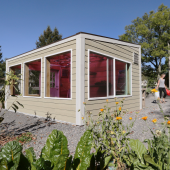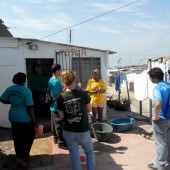
This case study describes a student-led campus sustainability initiative to design and implement a power-generating greenhouse at Allegheny College. The design of the greenhouse was carried out by students in collaboration with professionals in a variety of learning settings including research seminars, independent studies, paid internships, and senior thesis projects. By providing a detailed account of the student-driven design process and structuring the analysis around a framework of documented sustainability competencies, this paper identifies challenges and opportunities for utilizing living labs for sustainability education. Researchers observed that students who contributed to greenhouse development in multiple capacities developed several sustainable competencies. The project also demonstrates the difficulty of engaging students in both the planning and implementation stages of multi-year efforts. While the student-led design process introduced new logistical challenges, deep levels of student commitment and unique student backgrounds were critical to the greenhouse project’s success.
Continue Reading
It is widely acknowledged that the sustainability challenges facing the world require new approaches to teaching and learning. At the community level, however, sustainability priorities are context specific, so prescriptions of what and how to teach for sustainability are limiting. In higher education, one innovative approach to sustainability education that acknowledges the limits of conventional coursework involves courses based on “shared action learning” – a process in which students, faculty, and community sponsors share learning experiences while working on sustainability projects for a specific community. Shared Action Learning can be applied in any community context near or far from campus ranging from the very local campus community to distant settlements across the globe. This paper describes the processes, opportunities and challenges of shared action learning through five stages: (1) project impetus, (2) contextual research and project planning, (3) community engagement and project refinement, (4) action, and (5) reflection and reporting. The roles of students, faculty, sponsors, and communities throughout the semester-long shared action learning project are explored through two examples – a course at Clark University in Worcester, MA that focuses on SAL within the college campus community and a Worcester Polytechnic Institute program through which students work on projects with partners in informal settlements in Cape Town, South Africa.
Continue Reading